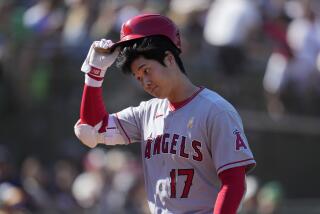Book review: ‘Branch Rickey’ by Jimmy Breslin
Branch Rickey
Jimmy Breslin
Viking/Penguin Lives: 148 pp., $19.95
“I had a problem for a writer,” Jimmy Breslin tells us in the prologue to “Branch Rickey,” his impressionistic portrait of baseball’s great emancipator, the man responsible for bringing Jackie Robinson to the major leagues. “The rule I followed from my first day as a copyboy in the sports departments was that you couldn’t write about a game unless you went to see it. … The trouble is, I spoke to Branch Rickey only once in my whole life.”
Here, in a nutshell, we see both the charm and the drawback of “Branch Rickey,” a thin book padded in places with digressions and outside materials (including 10 pages of statements from Robinson’s 1944 court martial for insubordination while in the Army) but also elliptically evocative, meandering and funny, and always marked by Breslin’s point of view. That’s a useful strategy — perhaps the only useful strategy, since the Rickey-Robinson story is so well-known by now as to have taken on the glow of myth. “Mister Rickey,” Robinson asks during their epochal August 1945 meeting at the Dodgers’ offices on Montague Street in Brooklyn, “do you want a ballplayer who is afraid to fight back?” To which Rickey replies: “I said I want a ballplayer with guts enough not to fight back.”
Although “Branch Rickey” is ostensibly a mini-biography, Breslin focuses primarily on his subject’s efforts to integrate the Dodgers and, by extension, baseball. In that, it represents a return to Breslin’s roots, a kind of mirror image to his woefully underappreciated “Can’t Anybody Here Play This Game?” (1963), an account of Casey Stengel and the first season of the New York Mets.
Like Rickey, Stengel was larger than life, gruff, unorthodox. And like Robinson’s arrival, the Mets came into being out of a Rickey plan to open up professional baseball, in this case by creating a third major league. Breslin doesn’t deal with that in his new book (the league never got off the ground, but Rickey’s attempt led to expansion), but he does make the case for Rickey as a visionary.
Late in the book, he describes a Brooklyn polling place across the street from where Ebbets Field once stood, as an election worker named Marie Lewis mimics the way Robinson taunted opposing pitchers on the base paths. It is election night 2008, and if you ever had doubts about the significance of sports, Breslin lays them all to rest.
“I am asking,” he writes, “if anybody else here remembers Jackie Robinson playing across the street, and then there was sudden noise and I don’t remember precisely what time it was, but the polls were closed and somewhere a television showed Barack Obama and a whoop ran through the corridor … and the election workers were kissing and Ms. Marie Lewis was swaying and swaggering, her feet remembering the start of the long march that got us here.”
It’s a goose-bump moment, one that, Breslin suggests, goes back to Rickey and Robinson and what they accomplished all those years ago.
More to Read
Sign up for our Book Club newsletter
Get the latest news, events and more from the Los Angeles Times Book Club, and help us get L.A. reading and talking.
You may occasionally receive promotional content from the Los Angeles Times.







